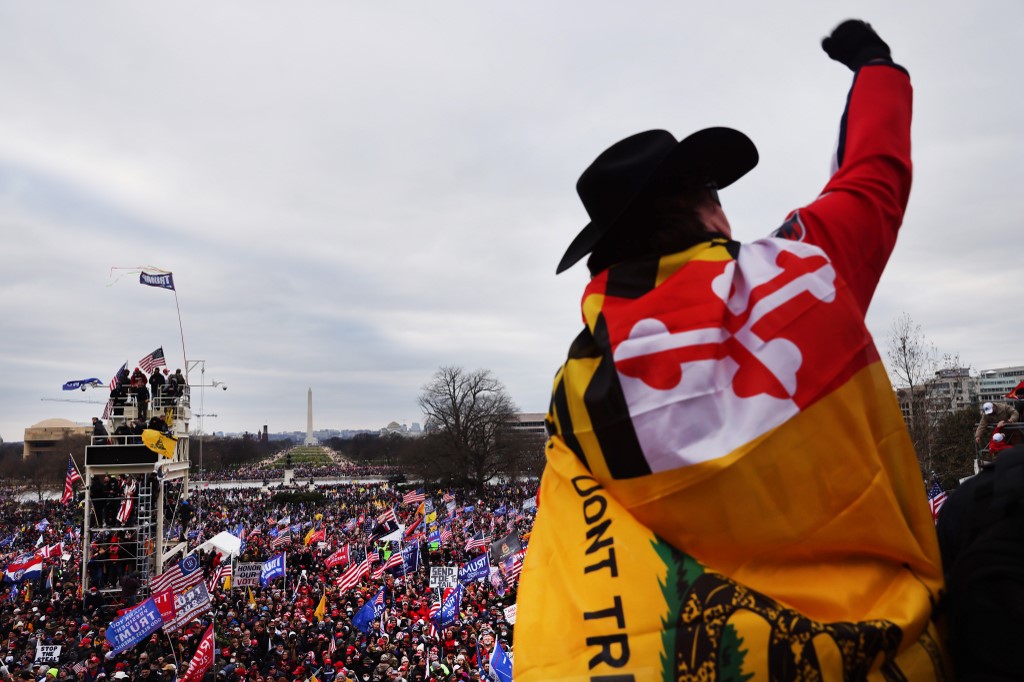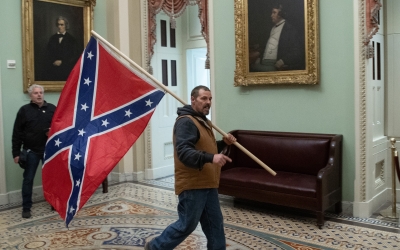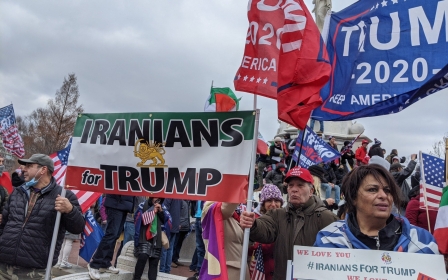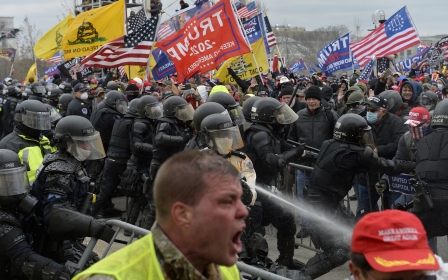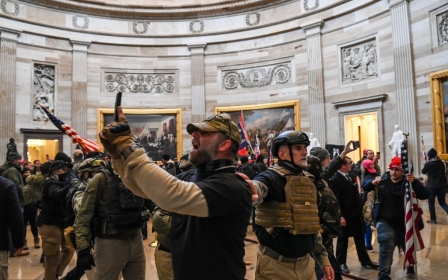US Capitol riots: The biggest threat to America is at home
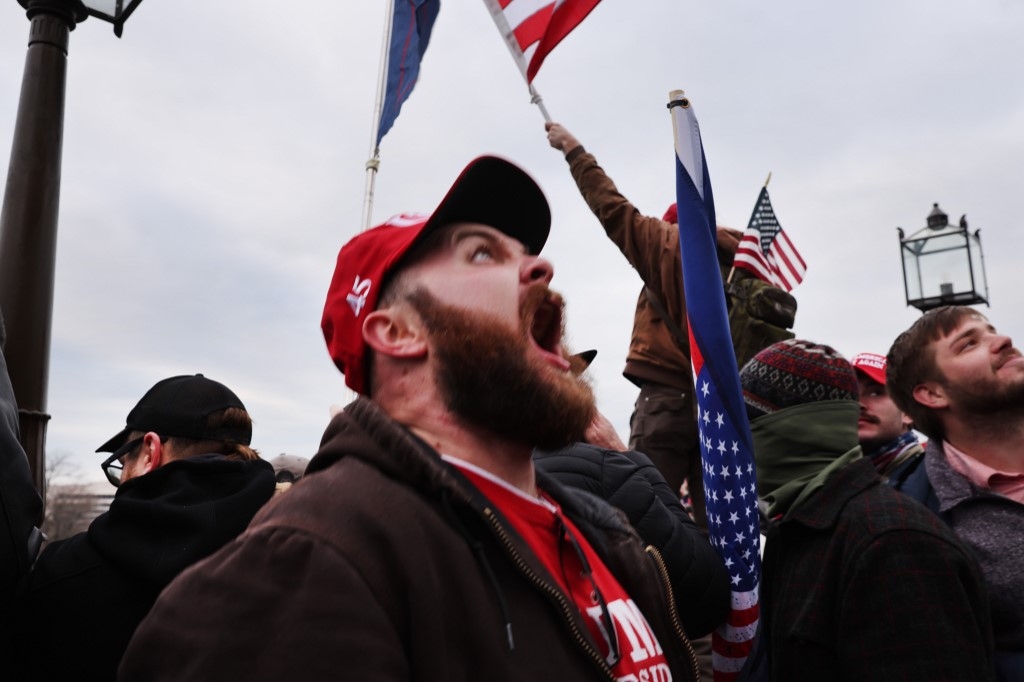
For at least three decades, the US victory in the Cold War notwithstanding, American governments have overflowed with political statements and warnings highlighting how much the country and its democracy are under attack. Its freedom and interests, they argue, are threatened by Russian authoritarianism and cyber-warfare, China’s trade and technological war, Iranian and Syrian state terrorism, and North Korean nuclear weapons.
Even small and fragile states, such as Cuba, Venezuela, Serbia, Libya and even Panama, have been included in the extended US definition of “threat”.
On 6 January, however, it became far too evident that the biggest threat to US democracy is internal - and it is represented by some of its own citizens.
The unpreparedness of US law enforcement and intelligence on Wednesday was unbelievable. A full investigation is urgently needed
Images of the US Capitol building being stormed by President Donald Trump’s supporters on Wednesday offered a stark representation of this sad and embarrassing reality, which has not spared the US from sarcastic comments highlighting its usual double standard.
No Chinese wolf or "cyber warrior", no Russian "internet troll", and no Iranian "terrorist" ever achieved what we watched outside and inside the Capitol in Washington on Wednesday.
The US Congress recently approved another huge defence bill, vastly overshadowing both the country’s friends and its foes, to ensure unparalleled military and intelligence capabilities around the globe - and yet, sadly, it appears incapable of protecting even the headquarters of its own democracy.
The unpreparedness of US law enforcement and intelligence on Wednesday was unbelievable. A full investigation is urgently needed. After Pearl Harbor and 9/11, the events of 6 January mark the third dramatic example in less than a century in which the US has shown such incredible weakness and negligence. Far too alert to external threats, the country is inconceivably blind towards internal ones.
An inconvenient truth
It is time to come to terms with an inconvenient truth: the US has always been looking for external enemies - monsters to destroy - to keep at bay its internal ones. Trump’s presidency and his supporters, whether deliberately or not, have finally ripped through this veil of hypocrisy.
The US, unfortunately, has always been a violent and polarised society with huge internal social tensions, as exemplified by its turbulent history of slavery, civil war, genocide against native Americans, and civil rights mobilisations in the 1950s and ‘60s.
For decades, the many good things the US has provided to humankind’s progress have obscured such original sins. But now the king is naked. A second civil war seems to be looming.
The globalisation and financialisation of the US economy in recent decades has caused an explosion of huge inequalities, which have also affected the white middle class. When such disparities affected only the Black population and other minorities, a hypocritical “business as usual” mindset prevailed, but when the interests of white middle America was also severely touched, the system started collapsing.
The financial bubble exploded in 2008, heavily affecting wide segments of society, including the white population. The revolt of the “deplorables” began to brew, first with Sarah Palin in the 2008 presidential race and the rise of the Tea Party, and then with the slow, unsettling metamorphosis inside the Republican Party.
Former President Barack Obama, who was not helped by his Hamletic doubts and irresoluteness, tried to manage and heal such fractures, but a sometimes legitimate anger - joined by lunatic conspiracy views fuelled by social media - prevailed and brought Trump to the White House.
Tip of the iceberg
No matter how much effort Washington’s Blob (a term for the US foreign policy and security establishment) put into distracting Americans with real or alleged external threats - nuclear Iran, Islamic terrorism, Russian interference, Chinese competition - the country’s internal contradictions have prevailed. The Covid-19 pandemic and its dramatic economic and social consequences have further exemplified how broken the US is, and how unfairly it treats too many of its own citizens.
Trump’s presidency will be studied by legions of historians and scholars. The temptation to dismiss it as an aberration or temporary foolishness, and to resume “business as usual”, will be very high - but this would be a huge and unforgivable error.
The 45th president of the United States has revealed only the tip of a far larger, and very concerning, iceberg. Let’s hope that the 46th, finally formally proclaimed and due to be sworn in later this month, will deal with the iceberg in its entirety.
The views expressed in this article belong to the author and do not necessarily reflect the editorial policy of Middle East Eye.
Middle East Eye propose une couverture et une analyse indépendantes et incomparables du Moyen-Orient, de l’Afrique du Nord et d’autres régions du monde. Pour en savoir plus sur la reprise de ce contenu et les frais qui s’appliquent, veuillez remplir ce formulaire [en anglais]. Pour en savoir plus sur MEE, cliquez ici [en anglais].



